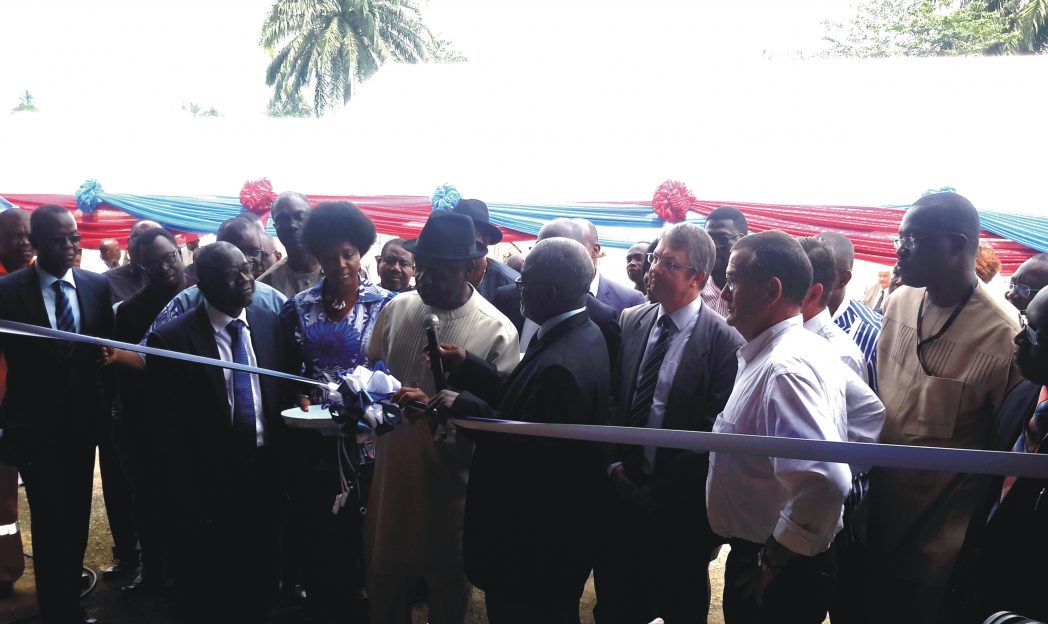Oil & Energy
NCDMB Lauds Firm Over Local Content Dev

Executive Secretary, NCDMB, Ernest Nwakpa,, cutting the tape to inaugurate Benkline workshop in Port Harcourt, last Thursday. He is flanked by Chairman, Board of Directors, Benkline, Larry Osai (with mic), Jean-Claude Vachet of Total (3rd right), Thierry Bunel-Gourdy of Eurofiliales (2nd right) and General Manager, NCD, Shell Nigeria, Igo Weli (right).
Authorities of the Nigerian
Content Development and Monitoring Board (NCDMB) have lauded Benkline Nigeria Limited for blazing the trail as the first indigenous company to develop local expertise and begin in-country repairs and maintenance of critical original equipment in the Nigerian oil and gas industry.
Executive Secretary, NCDMB, Ernest Nwakpa, who gave the commendation last Thursday, at the official inauguration of a world-class one-stop pumps and rotating machines maintenance workshop built by Benkline in Port Harcourt, the Rivers State capital, said that the highly technical machines in the workshop meet the expectations of the board in its quest to enforce in-country domiciliation of knowledge and technology for the fabrication, repairs and maintenance of original oil and gas industry equipment.
Nwakpa, who inspected all equipment in the workshop, recalled his working visit to many oil and gas equipment manufacturing facilities across the world, and emphasized that what Benkline offers in-country was better than what most original equipment manufacturers (OEMs) provide abroad.
The executive secretary said that developing local capacity to provide in-country repair and maintenance services for critical equipment and technical spares in the oil and gas value chain was at the core of the mandate of the board, and added that the wholly Nigerian company has succeeded in checking capital flight, while at the same time reducing the costs and man-hours hitherto spent to deliver such services through offshore procurement system.
While showering encomiums on the company for setting the pace in partnering with OEMs to address the needs of the industry locally, Nwakpa, tasked Benkline to ensure that priority is given to research and development (R&D) to fast-track the development of indigenous human capacity and in-country domiciliation of the manufacture, repairs and maintenance of technical inputs in the oil and gas industry in Nigeria with a view to expanding the frontiers in the nation’s economy.
In his remarks, Chairman, House of Representatives Committee on NCD, Honourable Asita, expressed satisfaction with facilities at Benkline, and challenged other indigenous oil and gas companies to invest more in local content development to reduce the industry’s dependence on imported equipment and spares so as the grow the economy more speedily.
Asita assured that government would do its best to ensure that IOCs patronize indigenous companies in their equipment procurement, repairs and maintenance processes in line with the spirit of the NCD Law.
Earlier, Chairman, Benkline Nigeria Limited, Larry Osai, had stressed that their core service offerings include pumps and rotating equipment maintenance, HVAC, air compressors and planned management maintenance, as well as procurement of technical spares, workshop services and manpower supply and human capital development.
Listing Frank Mohn AS of Norway and Eurofiliales of France as major technical partners, Osai, a retired Shell Nigeria manager, said that the state-of-the-art workshop components include API mechanical seal test bench, sandblasting bay, and milling, grinding, balancing, lathe and welding machines, adding that it also boasts a combination of 3 to 8 tons forklift capacity as well as 5 and 7.5 tons hoist double girder overhead crane for machining, mechanical seals, pump repairs, offshore interventions, maintenance support, training and provision of technicians.
Flanked by top representatives of Frank Mohn, Morten Sivertsen and Gunnar Gunderson; and Eurofiliales, Thierry Bunel-Gourdy; the chairman explained that Benkline provides total marine, offshore and onshore pumps and pumping systems supply, installation and commissioning, HVAC solutions for marine and onshore operations in collaboration with MizCo of Australia, while also providing cost effective maintenance solutions on compressed air equipment for offshore operations in technical partnership with Tamrotor Marine Compressors of Norway.
While thanking the major IOCs for their support so far, Osai noted that the company also provides comprehensive procurement of FPSO/FSO, refinery and production facilities specialist spares, including integrated logistics support for long lead equipment transport, and urged the IOCs take advantage of the huge opportunities available in Benkline to “save time, money and support local content”.
Also speaking, Managing Director of the company, John Onwah, thanked the IOCs, especially SPDC, SNEPCO, Total, NAOC and Chevron for their patronage, and the NNPC and its subsidiaries, particularly the DPR for their support, and pledged their commitment to be the hub in technical support and excellent services in the oil and gas industry in Nigeria and the entire sub-Saharan Africa.
Highlights of the event were the inauguration of the workshop by Nwakpa, and guided inspection tour of facilities conducted by Eurofiliales’ representative, Bunel-Gourdy.
Oil & Energy
NERC, OYSERC Partner To Strengthen Regulation

Oil & Energy
NLC Faults FG’s 3trn Dept Payment To GenCos

Oil & Energy
PENGASSAN Rejects Presidential EO On Oil, Gas Revenue Remittance ……… Seeks PIA Review

-

 News3 days ago
News3 days agoAmend Constitution To Accommodate State Police, Tinubu Tells Senators
-

 Politics3 days ago
Politics3 days agoSenate Urges Tinubu To Sack CAC Boss
-

 News3 days ago
News3 days agoDisu Takes Over As New IGP …Declares Total War On Corruption, Impunity
-
Business3 days ago
President Tinubu Extends Raw Shea Nuts Export Ban To 2027
-
Business3 days ago
Crisis Response: EU-project Delivers New Vet. Clinic To Katsina Govt.
-
Sports3 days ago
NDG: Rivers Coach Appeal To NDDC In Talent Discovery
-
Business3 days ago
President Tinubu Approves Extension Ban On Raw Shea Nut Export
-
Rivers3 days ago
Etche Clan Urges Govt On Chieftaincy Recognition

